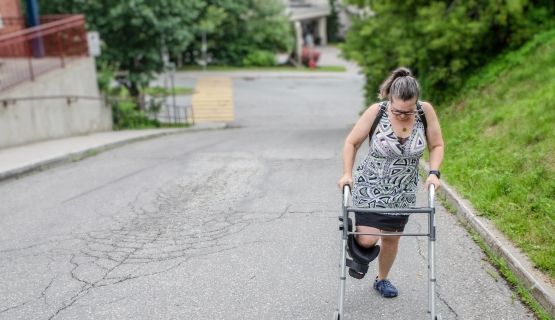Return to work, accommodation and support
IWH has a long history of conducting research on practices, policies and processes that help workers sustainably return to work after an illness or an injury. This page pulls together IWH research and resources on employer supports, job accommodations and modifications, as well as other related issues such as disclosure of disability.
Featured

Research Highlights
Telementoring program addresses return-to-work challenges for Ontario health-care providers
An IWH study has found that Ontario health-care providers face a range of challenges when treating workers with a work-related injury or illness and helping them return to work—a telementoring program called ECHO Occupational Environmental Medicine helped providers overcome some of these challenges.
Published: July 8, 2025

At Work article
Injured workers face mental health challenges beyond diagnosable conditions
Workers with a work-related physical injury that takes them off the job can have a wide range of mental health experiences, beyond diagnosable conditions. That’s according to an IWH study which also found that differences in injured workers’ mental health were linked to return-to-work outcomes.
Published: April 9, 2025
Video
Video
Creating effective return-to-work programs for workers with MSDs
What workplace-based interventions are effective in helping workers with musculoskeletal disorders (MSDs) recover and return to work after a period of work absence? This is the question that a team of researchers from the Institute for Work & Health (IWH) in Toronto, Canada, and the Institute for Safety, Compensation and Recovery Research (ISCRR) in Melbourne, Australia, set out to answer through a systematic review of high quality research on the topic.
Published: May 2017

IWH in the media
New study shows that life and career stage do matter when thinking about the impact of arthritis on employment
Arthritis affects 4.3 million Canadians, 60 per cent of whom are under the age of 65. Yet, we know little about how people with arthritis balance their work responsibilities with the management of their health condition at different stages of their lives, writes Institute for Work & Health (IWH) Research Associate Julie Bowring.
Published: CAPA Newsletter, May 2017

IWH in the media
Making the best of RTW interventions
Multi-faceted programs that package together different components have their advantages, writes Institute for Work & Health (IWH)'s Uyen Vu.
Published: Canadian HR Reporter, April 2017

IWH in the media
Getting back on one's feet
Healthcare providers who treat injured workers with multiple injuries and complex illnesses find the workers’ compensation system and return-to-work (RTW) process “opaque and confusing.” That's one of the findings from a two-year, multijurisdictional study by the Institute of Work & Health (IWH).
Published: OHS Canada, February 2017
Systematic Review
Systematic Review
Effective workplace-based return-to-work interventions: a systematic review update
This report synthesizes the evidence from a systematic review on the effectiveness of workplace-based return-to-work interventions and updates the Institute's 2004 systematic review on the same subject. This update brings in evidence published since 2004, and expands upon the original systematic review by including work absences due not only to musculoskeletal disorders, but also to mental health and pain-related conditions.
Published: February 2017

At Work article
Health professionals report uncertainty over roles in RTW of workers with complex injuries
Case managers and health-care professionals share their thoughts about doctors' role in the workers' compensation system.
Published: February 2017
IWH Speaker Series
IWH Speaker Series
Health-care providers and their role in return to work
Research around the world has shown that health-care providers have a key role in the return-to-work (RTW) process. However, pressure on consultation time, administrative challenges and limited knowledge about a patient’s workplace can thwart meaningful engagement. In a two-year study conducted in four Canadian provinces, Dr. Agnieszka Kosny focused on the experiences of health-care providers within the workers’ compensation system and their role in the RTW process. She shares her findings in this plenary.
Published: February 2017

At Work article
Effective workplace return-to-work interventions are multi-faceted: IWH review
Two's better than one. Three's better than two. According to a systematic review, workplace return-to-work programs are more effective when they offer different types of interventions, cutting across different domains.
Published: February 2017
Journal article
Journal article
An analysis of measurement invariance in work stress by sex: Are we comparing apples to apples?
Published: JASNH, January 2017
Journal article
Journal article
Workplace accommodations for persons with physical disabilities: evidence synthesis of the peer-reviewed literature
Published: Disability and Rehabilitation, January 2017